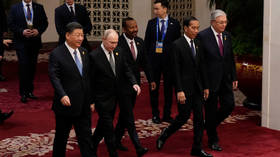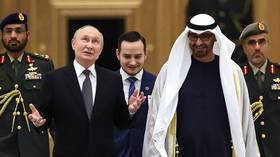Timofey Bordachev: BRICS expansion was the most important foreign policy event of 2023, what will match it in 2024?
The West will continue to lose influence this year, but it won’t go quietly into that good night
Predicting the future is the most thankless task when it comes to international politics. All of the genre, in fact, because it involves the interaction of living human beings. That means it is subject to chance, elementary error, and the influence of emotion. If this were not so, history would indeed go straight on “like the sidewalk of the Nevsky Prospect,” the main thoroughfare of St. Petersburg.
But not only is history unpredictable, it doesn’t repeat itself, which makes it utterly pointless to try to predict specific turns of events. The only thing we can talk about with relative certainty is the development of the major trends we can already see today.
In the coming year 2024, Russia will definitely be the largest continental country in the world, with the opportunity to develop ties in several geographical directions at once: To trade with its neighbors, to build new transport and logistics systems, and to thwart its opponents’ attempts to isolate it.
The United States will remain the largest “political island,” whose security and development, in principle, depend very little on what happens in its immediate surroundings.
China will remain a country with a huge population and economy in need of external markets and resources.
The European Union will continue to “sit on the windowsill” in the far west of Eurasia, always critically dependent on resources from outside. But it is no longer in a position to extract them on its own.
Central Asia, which is close to us, will remain an important link between Russia and China. The fate of states in that region, like that of the rest of the world, will be determined by the trends in world politics that we have seen in 2023.
Let’s start with the unpleasant – the things that will make us all tremble a little in our daily lives. Over the past year, the whole world has been confronted with the confrontation between globalization and autarky. The former, even in the form most free from the diktats of the West, implies reliance on economic expediency and broad participation in international production chains, investment, and trade. For several decades, this was rightly seen as the easiest and most effective way to achieve the goal of internal development and make life more comfortable for citizens.
Autarky, in turn, implies self-reliance in solving those tasks that are important for maintaining internal stability. However, since we do not know how to clearly define the limits of what is necessary, autarky always runs the risk of becoming absolute. Russia, as we know, is constantly confronted with this problem, up to the recent situation of egg shortages caused, among other things, by the outflow of migrant workers and disruptions in international supplies.
Since the spring of 2022, the United States, as the most self-isolating major country, began to systematically destroy the globalization it had created after World War II. The economic war against Russia, the pressure on China, and other measures are making everyone think about the need to reduce their dependence on the global economy. The Western Europeans sincerely don’t want to do this, but they lack the political will to do anything to oppose the Americans.
It is, therefore, safe to say that in 2024, we will be increasingly confronted with the consequences of the destruction of the existing system of links in the global economy. But at the same time, we will not be ready to be completely independent from it. Moreover, Russia will remain a market economy, which means that its companies will still have to take the price factor into account.
As globalization splits into national or regional zones, the prices of many goods will rise, and productivity will fall – simply because the world’s countries will have to forgo cheaper but politically risky solutions. How many years it will take to find a balance is hard to say now. But there will certainly be no let-up this year.
By 2023, the consolidation of a weakening West had become increasingly apparent. It is now a military-economic alliance involving the US and a significant group of medium-sized and small countries. It is characterized by strict internal discipline and the fact that the leader reaps most of the benefits.
The consolidation of the West will continue to create problems for international security and the world economy. This is simply because the united West will be – for a long time to come – unable to accept the new reality, to stop fighting the natural course of history, and to start adapting to it. As can be seen from recent statements by politicians in Washington and its allies, the US has no other solution to its problems than to regain at least some of its former power and control. Even if key people realize that this is impossible, they will never admit it, so they will meddle and create confusion in different parts of the planet.
This will be countered by the global majority: The aggregate of the world’s states, comprising about three-quarters of the UN’s membership, which are increasingly focused on their own interests. This term was coined in 2022 to refer to countries that have not initiated or supported the West’s economic war against Moscow at the state level – even if their companies and banks are forced to comply with US and EU bans on pain of retaliation. They are constantly looking for and finding ways to continue trading and generally doing business with Russia. In 2023, this phenomenon was already fully obvious.
The most striking examples come from India, (NATO member) Turkey, the Arab states of the Persian Gulf, all Asian countries (except Japan and South Korea), and all CIS members.
The world majority is not a community of countries united by a common purpose or an alliance. Rather, it is a behavioral phenomenon in which states act on the basis of their own interests rather than being “aligned” with the policies of the US, EU, Russia, or China. So we have to take into account that in 2024 our CIS neighbors will be as “defiant” towards us as the traditional US allies in the Arab East are towards Washington. But right now, such mass emancipation is beneficial to Russia, because it is Moscow that is interested in the openness of others to contact and cooperation. And it is not good for the US because it has to keep external actors in line.
The most important event in international politics in 2023 was related to this phenomenon. It is, of course, the bolstering of the BRICS group and the decision to expand it by five new states. They are all different in size, economic weight, and importance in world politics: Successful and wealthy Saudi Arabia joins dysfunctional Ethiopia. Independent Iran has a sea border with the United Arab Emirates, where a US air base remains. But the main thing is that all these states are actively trying to revise the unjust international order that emerged after the end of the Cold War. For Russia, strengthening BRICS after its enlargement will be the most important foreign policy task in 2024.
So far, as we can see, the main trends in international life in 2023 look as if they will continue to create difficulties but will not pose significant risks to Russia’s position and its ability to achieve its goals. Taking advantage of these and coping with the risks is a matter of national foreign policy, implemented on the basis of internal consolidation and confidence in its legitimacy.
This article was first published by ‘Vzglyad’ newspaper, translated and edited by the RT ream








Comments are closed.